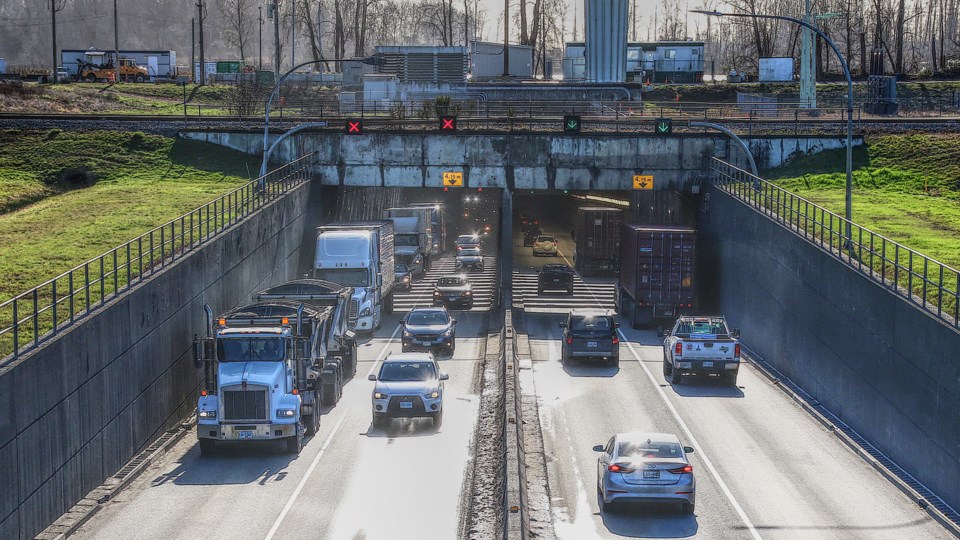Leaders within B.C.’s business community say the province needs to catch up when it comes to major capital investments – especially in local transportation and energy infrastructure – to ensure the province’s position as a reliable trade partner and to support its long-term economic growth.
However, given ongoing major capital projects and B.C.’s slowing economic growth, some experts say they think it’s unlikely there will be new announcements of large capital projects in the upcoming 2024-25 provincial budget, which is scheduled to be tabled Feb. 22.
“The province’s capital budget is already very high. It’s probably tripled in the last five years.… There is a lot of capital spending already underway,” said Ken Peacock, chief economist of the Business Council of British Columbia (BCBC).
He said expenditures on construction in the public sector exceeded those in the private sector for the first time in 2022-23, and that the slowing economy in B.C. doesn’t help, because that ultimately means less tax revenue for the province.
Major capital projects that have been announced or that are under construction include the $4.15 billion Fraser River Tunnel, $4.01 billion Surrey Langley SkyTrain, $2.83 billion Broadway Subway, $2.88 billion new Surrey Hospital and BC Cancer Centre, $1.7 billion Burnaby Hospital Phase 2 and BC Cancer Centre, among others.
The B.C. Ministry of Transportation and Infrastructure confirmed in a statement to BIV that both the Surrey Langley SkyTrain and Fraser River tunnel will be included in Budget 2024-25.
The province also announced a $224 million Highway 1 four-laning project in December 2023, budgeting for which has not been broken down but is expected to be clarified in the 2024-25 budget.
“The Highway 99 tunnel program and the Fraser Valley Highway 1 corridor Improvement …are two significant projects that will serve to support Canada’s growing trans-pacific trade and enhance the livability of surrounding communities,” said Duncan Wilson, vice-president environment and external affairs at the Vancouver Fraser Port Authority.
However, some business leaders said B.C. is just catching up with infrastructure building, which has been underinvested in for many years, and there is a pressing demand for more major capital projects to support trade and the province’s economy, and to meet the demand of a fast-growing population.
“The infrastructure that supports [trade], which is often commonly referred to as the supply chain infrastructure, like roads and bridges, ports, airports and other infrastructure, has been underinvested in for many, many years,” said Chris Gardner, president of Independent Contractors and Businesses Association of B.C.
He referenced the Final Report of The National Supply Chain Task Force 2022, which noted that Canada’s transportation supply chain is nearing its breaking point, risking the country’s reputation as a reliable trading partner.
“Because we’ve underinvested in the infrastructure that is necessary to move our goods to market and receive goods from other countries.… So I think a focus on trade-enabling infrastructure is important and should be a focus for the government,” said Gardner.
And as four major projects that have a total investment of close to $100 billion are coming to an end in 2024 – Site C dam, LNG Canada, Trans Mountain pipeline expansion and Coastal Gaslink pipeline projects – there is a need for new major investments in the province.
“The project approval process in British Columbia is painfully slow,” Gardner said. “As a result, investors are reluctant to commit the time, the energy, the capital, to make the investments required to fund these major projects in British Columbia.”
“The government has got to make the regulatory regime more attractive, provide incentives that basically say, British Columbia is open for business,” he added.
Gardner said the province should prioritize building more infrastructure to ensure that B.C. can deliver the power needed to keep the lights on in businesses and homes. In 2023, the province imported 20 per cent of the electricity that it used, added Gardner.
The North American Electric Reliability Corp. (NERC) published a report earlier this year that said by 2026, B.C. may be at risk of not being able to provide the electric power it is going to need to consistently fuel its economy.
Anita Huberman, president and CEO of the Surrey Board of Trade, said she hopes the city will continue to invest in building local transportation systems to meet fast-growing demand, and start investing in the infrastructure needed for a high-speed rail line running between Vancouver, Seattle and Portland.
In December, the Biden administration announced it would earmark US$6.1 billion to help build a high-speed rail system in the U.S. including a high-speed rail line cross the border.
“That will matter to the regional economic development division that all of us have here in Metro Vancouver,” said Huberman.
BCBC has been a strong supporter of a more efficient railway line down the Cascadia corridor linking B.C., Washington state and Oregon. However, Peacock said it is unlikely to see significant funding for the project in the 2024-25 budget.
“Given the constrained environment and already elevated capital spending, I would be surprised to see any funding earmarked for that project and I think this budget is more of a medium-term thing,” he said.
https://twitter.com/xiong_daisy



